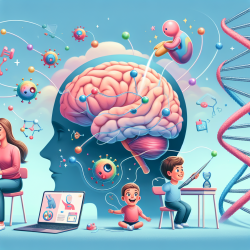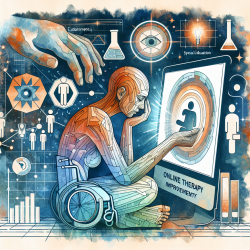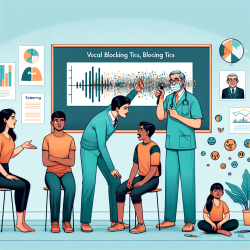Introduction
In the field of speech-language pathology, understanding the genetic underpinnings of neurodevelopmental disorders is crucial for designing effective therapeutic interventions. The recent research article titled "Expanding the phenotypic spectrum of NAA10-related neurodevelopmental syndrome and NAA15-related neurodevelopmental syndrome" offers groundbreaking insights that can significantly enhance our approach to therapy.
Understanding NAA10 and NAA15 Syndromes
The study delves into the genetic variations in the NAA10 and NAA15 genes, which are part of the N-terminal acetyltransferase A (NatA) complex. This complex is responsible for the acetylation of proteins, a modification crucial for normal cellular function. Variations in these genes can lead to a range of neurodevelopmental issues, including intellectual disabilities, autism spectrum disorders, and motor delays.
Key Findings and Implications
Through a genotype-first approach, the study assessed 106 individuals with NAA10 variants and 66 with NAA15 variants. The findings revealed significant differences in the phenotypic spectrum of these syndromes, with NAA10 variants generally resulting in more severe outcomes.
- Individuals with NAA10 variants often exhibited more severe intellectual disabilities and motor function impairments.
- NAA15 variants, while still impactful, tended to result in less severe phenotypes.
- Both syndromes showed a wide range of clinical features, including cardiac anomalies, visual impairments, and delayed milestones.
These insights underscore the importance of personalized therapeutic strategies that consider the specific genetic and phenotypic profiles of each child.
Practical Applications for Practitioners
For practitioners, integrating these findings into practice can lead to more tailored and effective interventions. Here are some actionable steps:
- Genetic Screening: Encourage genetic testing for children with unexplained neurodevelopmental issues to identify potential NAA10 or NAA15 variants.
- Customized Therapy Plans: Use genetic insights to develop personalized therapy plans that address the specific needs and challenges associated with these syndromes.
- Collaborative Care: Work closely with geneticists and other specialists to provide comprehensive care that addresses both the genetic and developmental aspects of these disorders.
Encouraging Further Research
The study highlights the need for continued research to fully understand the genetic and phenotypic complexities of NAA10 and NAA15 syndromes. Practitioners are encouraged to stay informed about the latest research developments and consider participating in studies that aim to expand our knowledge of these conditions.
To read the original research paper, please follow this link: Expanding the phenotypic spectrum of NAA10-related neurodevelopmental syndrome and NAA15-related neurodevelopmental syndrome.










